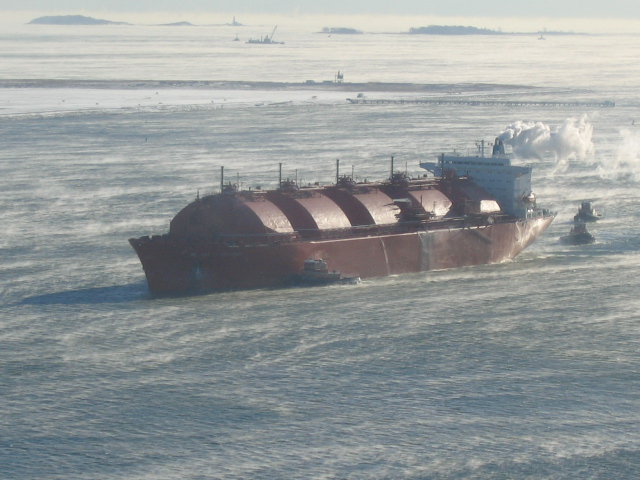
OTTAWA – Some of Canada’s allies are praising Ottawa’s work on preventing Russia from smuggling oil through concealed ships — ships that Ottawa fears could someday unleash an environmental cataclysm in the Arctic.
Canada and its allies have blacklisted more than 400 unregistered ships — known as shadow vessels — in just six months.
The effort aims to starve Russia of funding for its war on Ukraine while preventing leaky ships from one day compromising Canada’s Arctic environment.
“The idea of illegal, substandard, uninsured vessels transiting through High North and Arctic waters was, is, and remains a terrifying prospect,” said David Angell, a foreign and defence policy adviser to Prime Minister Mark Carney, during a panel hosted by the Polish Embassy in Ottawa on Oct. 10.
The issue is becoming more pertinent to Canada due to climate change in the Arctic, he said.
Global rules require ships to be registered to a country whose laws and tax codes apply. Russian ships have swapped their flags for a wide range of countries, said Elzbieta Kaca, an analyst at the Polish Institute of International Affairs.
“They can easily re-enter the system even if they are sanctioned, under a new name, under a new flag and under new ownership,” she told the Oct. 10 panel.
Russia has sought for years to evade sanctions western countries put in place after its initial 2014 invasion of Ukraine and its full-scale invasion in 2022.
Those sanctions include a price cap on Russian oil. G7 nations and others enforce the price cap by preventing companies from insuring or providing any other assistance to ships which transport Russian petroleum products, unless the price per barrel is below the cap.
Anna Kostrzewa-Misztal, a Polish foreign ministry senior official who focuses on Russia, said Moscow responded by using unregistered ships or ships registered to other countries — a shadow fleet.
“The problem appeared immediately after the price cap was introduced,” she told the Oct. 10 panel.
She said Canada pushed its G7 peers to crack down on this shadow fleet and this “wonderful collaboration” has undercut Russia’s efforts to evade sanctions.
“It wouldn’t be possible without Canada and without the G7,” she said.
“I’m absolutely convinced and sure that you are such an important pillar of this logic, of these dynamics.”
Canada has worked with the G7 to create a blacklist of Russia-linked vessels, she said, while Denmark has been co-ordinating with European countries, particularly Nordic and Baltic governments.
Earlier this month, a group called the Nordic-Baltic Eight met in Ottawa alongside most G7 members — except for the U.S.
In a joint statement, the group called out “the use of older, underinsured, and poorly maintained ships that routinely disable or manipulate their automatic identification systems, and the use of stateless or falsely flagged vessels.”
It has pledged to continue maritime surveillance and intelligence sharing to pursue sanctions evasion.
Finland’s Ambassador in Ottawa Hanna-Leena Korteniemi said Finns are “very grateful” to Canada for pushing forward the issue at the G7 because Russian tankers can contaminate European ecosystems and encourage Moscow to make war beyond Ukraine.
The shadow fleet’s use of GPS jamming is a particular concern for Finland, because tankers trying to evade detection can accidentally collide with passenger or commercial ships. Russian tankers leaving St. Petersburg can come close to Helsinki, Stockholm and Copenhagen.
Moscow insists it’s abiding by global rules despite numerous documented incidents. Russia’s foreign ministry argues western countries are trying to limit its access to international waters.
Korteniemi said one estimate says more than a third of the ships associated with Russia in the Baltic Sea do not have insurance, which raises the risk of affected countries being stuck with the cost of cleaning up after ecological catastrophes.
“There really are signs of impacts on the Russian economy, that the sanctions are working and we are seeing cracks in the economy,” she said. “We just need to tighten the rope. There needs to be a very multifaceted approach.”
Mitchell Robitaille, a Global Affairs Canada official helping to oversee the G7 task force on Russia’s shadow fleet, said sanctions appear to be having an effect but amount to a constant game of catch-up.
“As much as we want to try to be ahead, and we want to be strategic, when it comes to enforcement we’re often one step behind,” he said.
“Russia will always find, or try to find, new ways to circumvent sanctions.”
He said Canada’s work includes “preventing countries from inadvertently becoming safe havens,” particularly when vessels are registered in countries that are under Russian influence or lack the resources to properly inspect which ships are being registered.
Kaca told the Oct. 10 panel Russian ships carrying oil have been registered in places like Comoros, Oman and Panama. Kaca said the measures western countries have taken are likely causing a decline in the number of these ships showing up in Europe.
“This effort to blacklist so many vessels has really diminished the volume of oil, and oil products, which were transported by the Russian shadow fleet,” she said.
Kaca noted the EU put diplomatic pressure on Panama and Barbados to stop allowing Russian ships to register under their flags. International bodies could consider forcing the companies who operate flag registries to comply with global rules and sanctions, she said.
Kaca said the U.S. would have a huge impact if it issued secondary sanctions on countries enabling Russian vessels, including those that register them under their flag.
Robitaille said Canada does “significant outreach” with countries registering Russian shadow vessels beyond diplomatic pressure. Ottawa also offers technical assistance to countries that can’t keep on top of how ships they’ve registered are actually being used.
“Oftentimes, it becomes a challenge of bandwidth and resources for some of these third countries,” he said.
This report by The Canadian Press was first published Oct. 28, 2025.